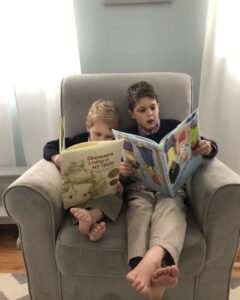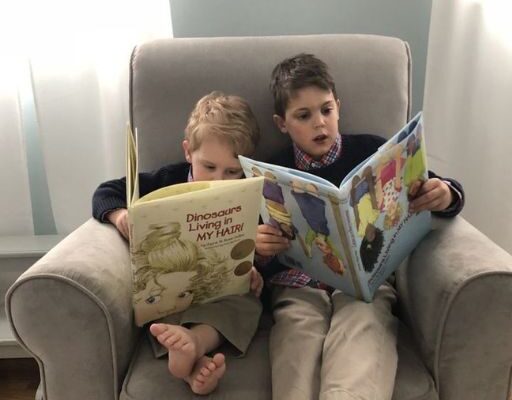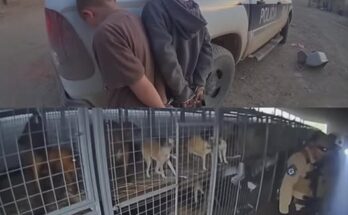It started off adorably enough.
Sunday morning. Cartoons off. Cereal bowls still half full. The boys crawled into the armchair with their books like two little retirees in training. Ezra grabbed Dinosaurs Living in My Hair, and Theo, trying to act “grown up,” flipped open a picture book upside down and declared, “We’re reading the newspaper now, Mom.”

I laughed. Snapped a picture. It was one of those rare peaceful moments where no one was wrestling or yelling about juice.
But then Theo leaned in and whispered something to Ezra.
Ezra sat up straighter. Looked at me. Then turned the page slowly, like he wasn’t just reading anymore—he was investigating.
“Mom,” he said, “what’s a will?”
That moment froze me. My heart skipped a beat, and a lump formed in my throat. I glanced over at Theo, who now had the same serious look on his face. Both of my boys, normally full of energy and mischief, were suddenly so mature, so focused. They were reading a newspaper article about wills, of all things.
“Why do you ask?” I tried to keep my voice steady, but inside, panic was setting in.
Theo pointed to the picture book, the one he had been flipping upside down. “It’s in the news, Mom. They’re talking about a will. What’s a will? Why would someone need one?”
I took a deep breath and walked over, trying to act like it was no big deal, but inside, I was unraveling. The truth was, I hadn’t been fully honest with them—or myself—about the reality we were living.
For years, I’d been holding on to a secret I wasn’t sure how to explain. The fact that my husband, Daniel, had been battling an illness for the past year, one we hadn’t really talked about much. I had kept him out of most conversations with the boys, telling them he was “just tired” and needed rest. But deep down, I knew the truth wasn’t so simple. And now, my boys had stumbled upon it.
I had no idea how to explain it to them. The idea of Daniel being seriously sick was still hard to accept, even for me. I had kept the weight of it all on my shoulders, too scared to let anyone in, including the people who loved me most.
“Mom, is Dad going to be okay?” Ezra’s voice cut through my thoughts. The look on his face was full of confusion and concern. I saw him glance over at Theo, who was nervously fidgeting with the corner of the newspaper.
I could feel the tears welling up in my eyes. This wasn’t how I wanted to have this conversation. But it was clear that I couldn’t hide from the truth anymore. I couldn’t protect them from everything. And maybe, just maybe, it was time to stop pretending everything was fine when it wasn’t.
I took a deep breath and sat down on the arm of the chair. “Your dad’s been sick for a while,” I said softly. “He’s been resting a lot, but he’s fighting it, okay? He’s fighting really hard.”
Ezra nodded slowly, still not quite understanding. “Is he going to get better, though?”
The question hit me hard. I didn’t have the answer. I couldn’t give him the reassurance he needed because, deep down, I didn’t know myself. And that uncertainty, that fear of the unknown, made everything feel so much more real.
“I don’t know, sweetie,” I whispered, my voice cracking. “But we’re all going to be here for him. We’ll take care of him, together.”
Theo, who had been uncharacteristically quiet, looked up from the page. “Does Dad have a will?” he asked, his voice low but serious.
The question made my heart stop. It felt like the air in the room thickened, as though we were all holding our breath. How could I answer that? How could I possibly explain to them that I hadn’t even been able to talk about the idea of losing their dad without breaking down?
“I—” I started, but the words caught in my throat. “I think he might. But I’ll need to talk to him about it.”
Theo nodded, his small brows furrowing as he seemed to take in the gravity of the situation. My heart broke for them. They were just children, and here they were, trying to process the reality of their dad’s health, something I had spent so much time avoiding.
For the rest of the day, I kept trying to keep things light. We played board games, we made cookies, but I could feel the weight of the conversation lingering in the background. That night, after the boys had gone to bed, I sat down with Daniel.
He was sitting at the kitchen table, his face pale from the treatment, his hands trembling slightly as he reached for his cup of tea. I hadn’t told him about the conversation with the boys. Part of me wasn’t sure I could handle his reaction, or my own, for that matter.
But as I sat across from him, I realized I couldn’t avoid it anymore. We needed to talk. About everything.
“I need to ask you something,” I said, my voice low. “The boys… they’re asking about your will.”
Daniel looked up at me, his tired eyes locking with mine. For a moment, there was nothing but silence between us. And then, he exhaled deeply, as though he had been holding this conversation back for far too long.
“I’ve been meaning to talk to you about that,” he said quietly. “I’ve been putting it off, thinking I had more time. But now, I see I don’t.”
The knot in my stomach tightened. “Are you telling me that you haven’t done one yet?”
“I haven’t,” he admitted. “I’ve been so focused on everything else, I just couldn’t bring myself to face it. But I need to. And I need you to help me with it.”
The realization that Daniel had been avoiding the same fears I had felt—fear of loss, fear of leaving behind an unfinished life—was a painful one. We had been so caught up in our own worlds, in keeping up appearances, that we hadn’t even taken care of the basics. The practical things. The things that, in the end, would matter most to the people we loved.
“I’ll help you,” I said softly. “We’ll do this together.”
The next day, I called a lawyer. It wasn’t an easy decision. There was so much to sort through, so many things we hadn’t discussed yet. But as I spoke with the lawyer, things started to feel more organized, more manageable. It was the first step in securing the future, in making sure our boys would be okay no matter what happened.
Weeks passed, and slowly, Daniel started to get stronger. The treatments were taking effect, though he still had a long road ahead. The boys seemed to settle back into their routine, asking fewer questions but still looking for reassurance. I was able to give them that in small doses, holding on to the hope that, despite the uncertainty, we would be okay.
And then came the twist—the karmic moment that made everything worth it.
A few months after we’d gotten Daniel’s will in order, I received a letter from a distant relative of mine. It was one of those letters you don’t expect to get, one that arrives out of nowhere. It turned out, I was entitled to a small inheritance from a great-aunt I’d never met. The sum wasn’t life-changing, but it was significant. More importantly, it provided the cushion we needed to make sure Daniel could continue his treatment without worrying about finances. It felt like a sign, like life was giving us a second chance.
The lesson I learned was this: no matter how difficult or uncomfortable it might be, facing the hard truths—whether it’s about your health, your future, or your relationships—is what ultimately sets you free. The fear of the unknown is paralyzing, but once you face it, you find that you’re stronger than you ever thought possible. And sometimes, life will throw you a lifeline when you least expect it.
If you’ve found yourself avoiding something important, take it as a sign to face it head-on. Don’t wait for things to get worse. You are stronger than you think, and you deserve the peace that comes with taking control of your future.
Please share this post with anyone who might need a reminder that even the hardest conversations can lead to the greatest growth. And remember, the power to change your life is always in your hands.



